Joshua
Joshua (/ˈdʒɒʃuə/) or Jehoshua (Hebrew: יְהוֹשֻׁעַ Yəhôšuaʿ)[lower-alpha 1] is the central figure in the Hebrew Bible's Book of Joshua. According to the books of Exodus, Numbers and Joshua, he was Moses' assistant and became the leader of the Israelite tribes after the death of Moses.[3] His name was Hoshea (הוֹשֵׁעַ) the son of Nun, of the tribe of Ephraim, but Moses called him Joshua (Numbers 13:16), the name by which he is commonly known. According to the Bible he was born in Egypt prior to the Exodus.
Joshua | |
|---|---|
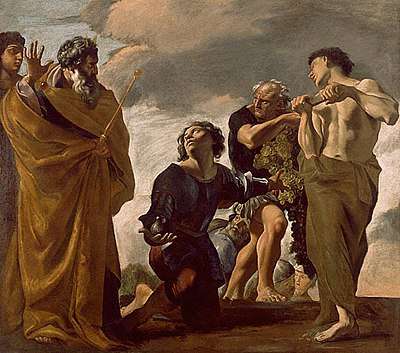 Moses and the Messengers from Canaan, Giovanni Lanfranco, oil on canvas, 85¾ × 97 in., at the J. Paul Getty Museum, Los Angeles | |
| Prophet | |
| Born | Goshen (Lower Egypt), Ancient Egypt |
| Died | Canaan |
| Venerated in | Judaism, Christianity, Islam |
| Major shrine | Tomb of Joshua |
| Feast |
|
| Attributes | Often depicted with Caleb, carrying the grapes out of Canaan |
| שופטים Judges in the Bible |
|---|
| Italics indicate individuals not explicitly described as judges |
| Pentateuch |
| Book of Joshua |
| Book of Judges |
| First Book of Samuel |
According to the Hebrew Bible, Joshua was one of the twelve spies of Israel sent by Moses to explore the land of Canaan. In Numbers 13:1–16, and after the death of Moses, he led the Israelite tribes in the conquest of Canaan, and allocated the land to the tribes. According to biblical chronology, Joshua lived some time in the Bronze Age. According to Joshua 24:29, Joshua died at the age of 110.
Joshua also holds a position of respect among Muslims. According to Islamic tradition, he was, along with Caleb, one of the two believing spies whom Moses had sent to spy the land of Canaan.[4] Muslims also see Joshua as the leader of the faithful following the death of Moses. Some Muslims also believe Joshua to be the "attendant" of Moses mentioned in the Quran before Moses meets Khidr. Joshua plays a role in Islamic literature with significant narration in the hadith.
Name
The English name "Joshua" is a rendering of the Hebrew language Yehoshua, interpreted in Christian theology as "Yahweh is salvation".[5][6] This requires a different vocalization of the second name component, reading it as related to Hoshea—the name used in the Torah before Moses added the divine name (Numbers 13:16).[7] The modern linguistic analysis of the name, however, is "Yahweh is lordly".[8]
"Jesus" is the English derivative of the Greek transliteration of "Yehoshua" via Latin. In the Septuagint, all instances of the word "Yehoshua" are rendered as "Ἰησοῦς" (Iēsoūs), the closest Greek pronunciation of the Aramaic: ישוע Yeshua, Nehemiah 8:17).[9][10] Thus, in modern Greek, Joshua is called "Jesus son of Naue" (τοῦ Ναυή) to differentiate him from Jesus. This is also true in some Slavic languages following the Eastern Orthodox tradition (e.g. "Иисус Навин", Iisús Navín, in Bulgarian, Serbian and Russian, but not Czech).
Biblical narrative
The Exodus
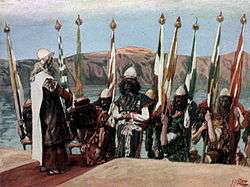
Joshua was a major figure in the events of the Exodus. He was charged by Moses with selecting and commanding a militia group for their first battle after exiting Egypt, against the Amalekites in Rephidim (Exodus 17:8–16), in which they were victorious.
He later accompanied Moses when he ascended biblical Mount Sinai to commune with God,[11] visualize God's plan for the Israelite tabernacle and receive the Ten Commandments. Joshua was with Moses when he descended from the mountain, heard the Israelites' celebrations around the Golden Calf,[12] and broke the tablets bearing the words of the commandments. Similarly, in the narrative which refers to Moses being able to speak with God in his tent of meeting outside the camp, Joshua is seen as custodian of the tent ('tabernacle of meeting') when Moses returned to the Israelite encampment.[13] However, when Moses returned to the mountain to re-create the tablets recording the Ten Commandments, Joshua was not present, as the biblical text states 'no man shall come up with you'.[14]
Later, Joshua was identified as one of the twelve spies sent by Moses to explore and report on the land of Canaan (Numbers 13:16–17), and only he and Caleb gave an encouraging report, a reward for which would be that only these two of their entire generation would enter the promised land (Numbers 14:22–24).
According to Joshua 1:1–9, God appointed Joshua to succeed Moses as leader of the Israelites along with giving him a blessing of invincibility during his lifetime (Joshua 1:5).[15][16] The first part of the book of Joshua covers the period when he led the conquest of Canaan.
Conquest of Canaan
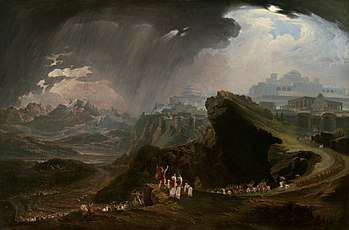
At the Jordan River, the waters parted, as they had for Moses at the Red Sea. The first battle after the crossing of the Jordan was the Battle of Jericho. Joshua led the destruction of Jericho, then moved on to Ai, a small neighboring city to the west. However, they were defeated with thirty-six Israelite deaths. The defeat was attributed to Achan taking an "accursed thing" from Jericho; and was followed by Achan and his family and animals being stoned to death to restore God's favor. Joshua then went to defeat Ai.
The Israelites faced an alliance of five Amorite kings from Jerusalem, Hebron, Jarmuth, Lachish, and Eglon. At Gibeon, Joshua asked Yahweh to cause the sun and moon to stand still, so that he could finish the battle in daylight. According to the text, the sun stopped in the middle of the sky and delayed going down about a full day. This event is most notable because "There has been no day like it before or since, when the Lord heeded the voice of a man, for the Lord fought for Israel" (Joshua 10:14). God also fought for the Israelites in this battle, for he hurled huge hailstones from the sky which killed more Canaanites than those which the Israelites slaughtered. From there on, Joshua was able to lead the Israelites to several victories, securing much of the land of Canaan. He presided over the Israelite gatherings at Gilgal and Shiloh which allocated land to the tribes of Israel (Joshua 14:1–5 and 18:1–10), and the Israelites rewarded him with the Ephraimite city of Timnath-heres or Timnath-serah, where he settled (Joshua 19:50).
Death
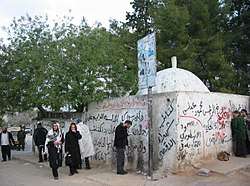
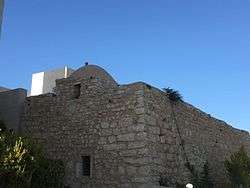
When he was "old and well advanced in years",[17] Joshua convened the elders and chiefs of the Israelites and exhorted them to have no fellowship with the native population, because it could lead them to be unfaithful to God.[18] At a general assembly of the clans at Shechem, he took leave of the people, admonishing them to be loyal to their God, who had been so mightily manifested in the midst of them. As a witness of their promise to serve God, Joshua set up a great stone under an oak by the sanctuary of God. Soon afterward he died, at the age of 110, and was buried at Timnath-heres, in the hill country of Ephraim, north of Mount Gaash.[19]
Historicity
The prevailing scholarly view is that the book of Joshua is not a factual account of historical events.[20] The apparent setting of Joshua is the 13th century BCE,[20] a time of widespread city-destruction, but with a few exceptions (Hazor, Lachish) the destroyed cities are not the ones the Bible associates with Joshua, and the ones it does associate with him show little or no sign of even being occupied at the time.[21] Archaeologists generally agree that the Israelites had Canaanite origins: the culture of the earliest Israelite settlements is Canaanite, their cult objects are those of the Canaanite god El, the pottery remains are in the Canaanite tradition, and the alphabet used is early Canaanite.[22] Almost the sole marker distinguishing the "Israelite" villages from Canaanite sites is an absence of pig bones, although whether even this is an ethnic marker or is due to other factors remains a matter of dispute.[22]
There is a consensus that the Joshua traditions in the Pentateuch are secondary additions. The spy story of Numbers 13–14; Deut. 1:34–7, in an earlier form only mentioned Caleb. E. Meyer and G. Hoelscher deny Joshua's existence as a historical reality and conclude that he is the legendary hero of a Josephite clan.[23]
Carolyn Pressler, in her 2002 commentary for the Westminster Bible Companion series, suggests that readers of the Book of Joshua should give priority to its theological message ("what passages teach about God") and be aware of what these would have meant to audiences in the 7th and 6th centuries BCE.[24] Richard Nelson explains, "The needs of the centralised monarchy favoured a single story of origins combining old traditions of an exodus from Egypt, belief in a national god as 'divine warrior,' and explanations for ruined cities, social stratification and ethnic groups, and contemporary tribes."[25]
Authorship of the biblical Joshua narrative is ascribed to Joshua himself by Bava Batra 15a (Talmud) and early church fathers, but in 1943 Martin Noth published an argument that behind Joshua and other books was a unified "Deuteronomistic history", composed in the early part of the Babylonian captivity (6th century BCE). Most scholars today believe in some such composite, containing the epic history of the premonarchical period.[26]
Internal evidence of the book of Joshua, and the repeated use of the phrase 'to this day' suggests that the events that it recounts took place some time before they were recorded.[27]
The first record of the name Israel occurs in the Merneptah stele, erected for Egyptian Pharaoh Merneptah c. 1209 BCE, "Israel is laid waste and his seed is not."[28] William Dever sees this "Israel" in the central highlands as a cultural and probably political entity, well enough established to be perceived by the Egyptians as a possible challenge to their hegemony, but an ethnic group rather than an organised state.[29]
The number of villages in the highlands increased to more than 300 by the end of Iron Age I[30] (more and larger in the north), with the settled population rising from 20,000 in the twelfth century to 40,000 in the eleventh.[31] The villagers probably shared the highlands with other communities such as pastoral nomads, but only villagers left sufficient remains to determine their settlement patterns.[32] Archaeologists and historians see more continuity than discontinuity between these highland settlements and the preceding Late Bronze Age Canaanite culture.[33] Certain features, such as ceramic repertoire and agrarian settlement plans, have been said to be distinctives of highland sites,[34] and collar-rimmed jars and four-roomed houses have been said to be intrinsically "Israelite", but have also been said to belong to a commonly shared culture throughout Iron I Canaan.[35] While some archaeologists interpret the absence of pig bones from the highland sites as an indicator of ethnicity,[36] this is not certain.[37] Villages had populations of up to 300 or 400,[31][38] which lived by farming and herding and were largely self-sufficient;[39] economic interchange was prevalent.[40]
According to archaeologist Ann E. Killebrew, "Most scholars today accept that the majority of the conquest narratives in the book of Joshua are devoid of historical reality".[41][42][43][44][45]
The question of the date and degrees of conquest and/or assimilation of the indigenous population is uncertain, as academics and archaeologists differ in their interpretation of the archaeological and other evidence.[46]
Views
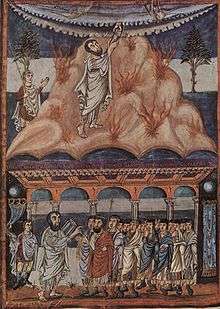
In rabbinical literature
In rabbinic literature Joshua is regarded as a faithful, humble, deserving, wise man. Biblical verses illustrative of these qualities and of their reward are applied to him. "He that waits on his master shall be honored"[47] is construed as a reference to Joshua,[48] as is also the first part of the same verse, "Whoso keeps the fig-tree shall eat the fruit thereof"[49] That "honor shall uphold the humble in spirit"[50] is proved by Joshua's victory over Amalek.[51] Not the sons of Moses—as Moses himself had expected—but Joshua was appointed as Moses' successor.[52] Moses was shown how Joshua reproved that Othniel.[53]
God would speak to Moses face to face, like someone would speak to his friend. Then he would return to the camp. But his attendant, Joshua the son of Nun, a young man, would not leave the tent. Joshua never moved from the tent.[13] Didn't Joshua leave the tent to eat, sleep or attend to his needs? This praise shows that Joshua had complete faith in Moses, the Tzaddik. One who has this faith is cognizant of the tzaddik in everything he does; he remains steadfastly with the tzaddik whatever he does.[54]
In Christianity
Most modern Bibles translate Hebrews 4:8–10 to identify Jesus as a better Joshua, as Joshua led Israel into the rest of Canaan, but Jesus leads the people of God into "God's rest". Among the early Church Fathers, Joshua is considered a type of Jesus Christ.[55]
The story of Joshua and the Canaanite kings is also alluded to in the 2 Meqabyan, a book considered canonical in the Ethiopian Orthodox Tewahedo Church.[56]
In Islam

Joshua (Arabic: يُوشَعُ بْنُ نُونٍ, Yūšaʿ ibn Nūn, /juːʃaʕ ibn nuːn/) is not mentioned by name in the Quran, but his name appears in other Islamic literature. In the Quranic account of the conquest of Canaan, Joshua and Caleb are referenced, but not named, as two "Allah-fearing men", on whom Allah "had bestowed His grace".[57]
They said, "Moses, there is a fearsome people in this land. We will not go there until they leave. If they leave, then we will enter." Yet the two men whom God had blessed among those who were afraid said, "Go in to them through the gate and when you go in you will overcome them. If you are true believers, put your trust in God.
Joshua was regarded by some classical scholars as the prophetic successor to Moses (موسى).[59] Tabari relates in his History of the Prophets and Kings that Joshua was one of the twelve spies and Muslim scholars believe that the two believing spies referred to in the Quran are Joshua and Caleb. Joshua was exceptional among the Israelites for being one of the few faithful followers of Allah.
Joshua is further mentioned in Islamic literature, and significant events from his Muslim narratives include the crossing of the Jordan river and the conquest of Bait al-Maqdis.[60]
The traditional Muslim commentary al-Jalalayn says, "Ahmad [b. Hanbal] reported in his Musnad, the [following] hadīth, 'The sun was never detained for any human, except for Joshua during those days in which he marched towards the Holy House [of Jerusalem]'."[61]
Muslim literature includes traditions of Joshua not found in the Hebrew Bible. Joshua is credited with being present at Moses's death and literature records that Moses's garments were with Joshua at the time of his departure.[62] In Sahih Bukhari and Sahih Muslim, Joshua is mentioned as Yusha' bin Nun and is the attendant to Moses during his meeting with Khidr.[63][64][65]
Ali, the cousin of Muhammad, was asked about the prophets that had special names. He narrates in Hadith that Yusha' ibn Nun was known as Dhu al-Kifl.[66]
Tombs
Joshua is believed by some Muslims to be buried on Joshua's Hill in the Beykoz district of Istanbul.[67] Alternative traditional sites for his tomb are situated in Israel (the Shia shrine at Al-Nabi Yusha'), Jordan (An-Nabi Yusha’ bin Noon, a Sunni shrine near the city of Al-Salt[68][69]), Iran (Historical cemetery of Takht e Foolad in Esfahan[70]) and Iraq (the Nabi Yusha' shrine of Baghdad[68]). A local tradition combining three versions of three different Yushas, including biblical Joshua, places the tomb inside a cave in the Tripoli Mountains, overlooking the coastal town of el-Minyieh near Tripoli, Lebanon[71][72]
In art and literature
- In the literary tradition of medieval Europe, Joshua is known as one of the Nine Worthies.
- In The Divine Comedy Joshua's spirit appears to Dante in the Heaven of Mars, where he is grouped with the other "warriors of the faith."[73]
- Baroque composer Georg Frideric Handel composed the oratorio Joshua in 1747. Composer Franz Waxman composed an oratorio Joshua in 1959.
Yahrtzeit
The annual commemoration of Joshua's yahrtzeit (the anniversary of his death) is marked on the 26th of Nisan on the Hebrew calendar. Thousands make the pilgrimage to the Tomb of Joshua at Kifl Haris near Nablus, West Bank, on the preceding night.
Yom HaAliyah
Yom HaAliyah (Aliyah Day; Hebrew: יום העלייה) is an Israeli national holiday celebrated annually on the tenth of the Hebrew month of Nisan to commemorate Joshua having led the Israelites across the Jordan River into the Land of Israel while carrying the Ark of the Covenant.
Joshua tree and Joshua's blind snake
Legend has it that Mormon pioneers in the United States first referred to the yucca brevifolia agave plant as the Joshua tree because its branches reminded them of Joshua stretching his arms upward in supplication, guiding the travelers westward.[74]
Joshua is commemorated in the scientific name of a species of snake, Joshua's blind snake (Trilepida joshuai ), the holotype of which was collected at Jericó, Antioquia, Colombia.[75]
Music
- Marc-Antoine Charpentier, Josue H 404 H 404 a, for soloists, double chorus, double orchestra and continuo 1680
See also
Notes
- Aramaic: יֵשׁוּע Yēšūʿ; Syriac: ܝܫܘܥ ܒܪ ܢܘܢ Yəšūʿ bar Nōn; Greek: Ἰησοῦς, Arabic: يُوشَعُ بْنُ نُونٍ Yūšaʿ ibn Nūn; Latin: Iosue
References
- (in Greek) "Ὁ Ἅγιος Ἰησοῦς ὁ Δίκαιος". Megas Synaxaristis.
- "Righteous Joshua the son of Nun (Navi)". Oca. Retrieved 8 January 2018.
- Michael D. Coogan, A Brief Introduction to the Old Testament, pages 166–67, Oxford University Press, 2009
- Quran 5:22–23
- A Hebrew and English Lexicon of the Old Testament. Francis Brown, with S.R. Driver & C.A. Briggs, based on the lexicon of William Gesenius. Oxford: Clarendon Press. pp. 221 & 446
- "Fausset's Bible Dictionary". Study Light. Retrieved 8 January 2018.
- "Joshua", New Bible Dictionary 2nd. ed. 1987. Douglas JD, Hillyer N, eds., Tyndale House, Wheaton, IL, USA ISBN 0-8423-4667-8
- The Elements ש(ו)ע/שבע/תע in Biblical Proper Names: A Re-evaluation, Journal of Northwest Semitic Languages 44 (2018).
- Numbers 13:16 LXX καὶ ἐπωνόμασεν Μωυσῆς τὸν Αὐσῆ υἱὸν Ναυῆ 'Ἰησοῦν' (and Moses named Hosea, son of Naue, Jesus)
- "Zechariah", Online Greek OT (Septuagint/LXX) UTF8 Bible, Bible database, 3:1–10, retrieved 8 January 2018
- Exodus 24:13
- Exodus 32:17
- Exodus 33:11
- Exodus 34:3
- "Joshua Chapter 1". sacred-texts. Retrieved 25 October 2014.
- Joshua chap. 1: Honour is here put upon Joshua, and great power lodged in his hand, by him that is… him the administration, by virtue of his solemn ordination in Moses's life-time. …and it will entitle them to the best blessings: God shall give them the desire of… be done, how invincible soever the difficulties may seem that lie in the way.
- Joshua 23:1–2
- Joshua 23:7–8, 23:12–13
- Joshua 24:29–30
- McConville (2010), p.4
- Miller & Hayes, pp. 71–2.
- Killebrew 2005, p. 176.
- Yohanan Aharoni, S. David Sperling. Encyclopaedia Judaica, 2nd ed. Volume 11. p. 442.
- Pressler, pp. 5–6
- Nelson, p. 5
- Dever, William, "What Did the Biblical Writers Know and When Did They Know It?" (Eerdmans) 2001, p. 100.
- Dillard, Raymond B.; Longman, Tremper III (1994), An Introduction to the Old Testament, Zondervan, p. 109
- Stager in Coogan 1998, p. 91.
- Dever 2003, p. 206.
- McNutt 1999, p. 47.
- McNutt 1999, p. 70.
- McNutt 1999, p. 69.
- Bright 2000, p. 472.
- Killebrew 2005, p. 13.
- Miller 1986, p. 72.
- Killebrew 2005, p. 176.
- Bright 2000, p. 473.
- Miller 2005, p. 98.
- McNutt 1999, p. 72.
- Miller 2005, p. 99.
- Killebrew, Ann E. (2005). Biblical Peoples and Ethnicity: An Archaeological Study of Egyptians, Canaanites, Philistines, and Early Israel, 1300–1100 B.C.E. Society of Biblical Lit. p. 186. ISBN 978-1-58983-097-4.
- Miller 1977, 87–93; Van Seters 1983, 322–37; Schoors 1987, 77–92; Na'aman 1994b, 218–30, 249–50
- Hubbard, Robert L. jr. (30 August 2009). Joshua. Zondervan. p. 203. ISBN 978-0-310-59062-0.
The current scholarly consensus follows the conclusion of Kenyon: Except for a small, short-lived settlement (c. 1400 B.C.), Jericho was completely uninhabited c. 1550–1100 B.C.
- Dever, William G. (1990) [1989]. "2. The Israelite Settlement in Canaan. New Archeological Models". Recent Archeological Discoveries and Biblical Research. Washington state: University of Washington Press. p. 47. ISBN 0-295-97261-0. Retrieved 2013-01-07.
Of course, for some, that only made the Biblical story more miraculous than ever—Joshua destroyed a city that wasn't even there!
- "Ann Killebrew —". cams.la.psu.edu. Retrieved 1 January 2020.
- Introduction to the Old Testament, ‘Joshua’, T. Longman and R. Dillard, Zondervan (2006)
- Proverbs 27:18
- Numbers Rabbah 12
- Yalkut Shimoni, Joshua 2; Numbers Rabbah 12:21
- Proverbs 29:23
- Numbers Rabbah 13
- Numbers Rabbah 12
- Yalkut Shimoni, Numbers 776
- Nachman of Breslov, Likutey Halakhot VII
- Nichols, Aidan (2007). Lovely, Like Jerusalem: The Fulfillment of the Old Testament in Christ and the Church. Ignatius Press. p. 195. ISBN 9781586171681.
- http://torahofyeshuah.blogspot.com/2015/07/book-of-meqabyan-i-iii.html
- Abdullah Yusuf Ali, The Holy Qur'an: Text, Translation and Commentary, Note. 726 to verse 23: "Among those who returned after spying out the land were two men who had faith and courage. They were Joshua and Caleb. Joshua afterwards succeeded Moses in the leadership after 40 years. These two men pleaded for an immediate entry through the proper Gate, which I understand to mean, 'after taking all due precautions and making all due preparations.' Cf. 2:189 and n. 203. But of course, they said, they must put their trust in Allah for victory."
- M. A. S. Abdel Haleem, translator (2005). The Qur'an. Oxford University Press. p. 70.(
- Joshua is mentioned as a prophet in Ibn Kathir's Stories of the Prophets
- Tabari, History of the Prophets and Kings, Vol. I: 414–429, 498–499, 503–516
- "QuranX.com The most complete Quran / Hadith / Tafsir collection available!". quranx.com. Retrieved 2018-08-15.
- Encyclopedia of Islam, Vol. XI, pg. 351, Yusha ibn Nun [Joshua, son of Nun]
- Bukhari, Book 6, Volume 60, Hadiths 249, 250, 251: Prophetic Commentary on the Qur'an (Tafseer of the Prophet (pbuh))
- Bukhari, Book 1, Volume 3, Hadith 124: Knowledge
- Muslim, Book 30, Hadith 5864: The Book Pertaining to the Excellent Qualities of the Holy Prophet (may Peace be upon them) and His Companions (Kitab Al-Fada'il)
- Qa'im, Mahdi Muntazir (2007). Jesus Through the Qur’an and Shi’ite Narrations (Bilingual ed.). Queens, New York: Tahrike Tarsile Qur'an. p. 26. ISBN 978-1879402140.
- "ISTANBUL, Extended On Two Continents". Retrieved 8 January 2018.
- Mazar Hazrat Yusha’ bin Noon, on the website of the Islamic Supreme Council of Canada
- Tomb of Prophet Yusha' (photo of the tomb; Islamic view on Prophet Yusha'/Joshua)
- "The buried prophets in Iran – Arash Nooraghayee". nooraghayee.com. Retrieved 2020-01-15.
- The Shrine of Prophet Yusha/Joshua (pbuh), Sacred Places in Lebanon - Holy Places in Lebanon
- El-Nabi Yusha' Mosque and Maqam, at DestinationLebanon.gov.lb, Lebanon Ministry of Tourism
- Simons, Dorothy Lister (8 January 2018). "The Individual Human Dramatis Personae of the "Divine Comedy"". Modern Philology. 16 (7): 371–380. JSTOR 432744.
- "Joshua Trees". nps.gov. National Park Service. Retrieved 2013-05-27.
- Beolens, Bo; Watkins, Michael; Grayson, Michael (2011). The Eponym Dictionary of Reptiles. Baltimore: Johns Hopkins University Press. xiii + 296 pp. ISBN 978-1-4214-0135-5. ("Joshua", p. 136).
Bibliography
- Auzou, Georges (1964), Le Don d'une conquête: étude du livre de Josué, Connaissance de la Bible (in French), Édition de l'Orante.
- Barton, John; Muddiman, John, eds. (2001), Oxford Bible Commentary, Oxford University Press.
- Barton, John (2004), The Biblical World, 2, Taylor & Francis.
- Brettler, Marc Zvi, How to read the Bible (Jewish Publication Society, 2005).
- Bright, John (2000). A History of Israel. Westminster John Knox Press. ISBN 978-0-664-22068-6.
- Coogan, Michael D. (ed), The Oxford History of the Biblical World (Oxford University Press, 1998)
- Day, John, Yahweh and the gods and goddesses of Canaan (Sheffield Academic Press, 2002)
- Dever, William, What Did the Biblical Writers Know and When Did They Know It? (Eerdmans, 2001)
- Dever, William, Who Were the Early Israelites and Where Did They Come From? (Eerdmans, 2003, 2006)
- Eerdmans Commentary on the Bible (ed. James D.G. Dunn, John William Rogerson, Eerdmans, 2003)
- Finkelstein, Israel; Mazar, Amihay; Schmidt, Brian B., The Quest for the Historical Israel (Society of Biblical Literature, 2007)
- Garbini, G., Myth and history in the Bible (Sheffield Academic Press, 2003)
- Graham, M.P, and McKenzie, Steven L., The Hebrew Bible today: an introduction to critical issues (Westminster John Knox Press, 1998)
- Killebrew, Ann E., Biblical Peoples and Ethnicity: An Archaeological Study of Egyptians, Canaanites, and Early Israel, p. 130.
- McNutt, Paula (1999). Reconstructing the Society of Ancient Israel. Westminster John Knox Press. ISBN 978-0-664-22265-9.
- Miller, James Maxwell; Hayes, John Haralson (1986). A History of Ancient Israel and Judah. Westminster John Knox Press. ISBN 0-664-21262-X.
- Miller, Robert D. (2005). Chieftains of the Highland Clans: A History of Israel in the 12th and 11th Centuries BC. Eerdmans. ISBN 978-0-8028-0988-9.
- de Pury, Albert; Römer, Thomas; Jean-Daniel, Macchi (2000), Israël constructs its history: Deuteronomistic historiography in recent research, Sheffield Academic Press.
External links
| Wikimedia Commons has media related to Joshua (Biblical figure). |
| Wikisource has original text related to this article: |
- The Book of Joshua, Douay Rheims Bible Version with annotations By Bishop Challoner
- Book of Joshua at BibleGateway
- Smith’s Bible Dictionary
- Easton's Bible Dictionary & Int. Standard Bible Encyclopedia
Joshua | ||
| Preceded by Moses |
Judge of Israel | Succeeded by Othniel |